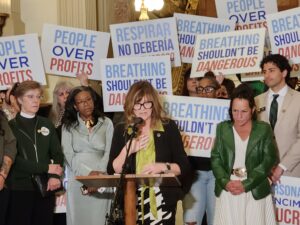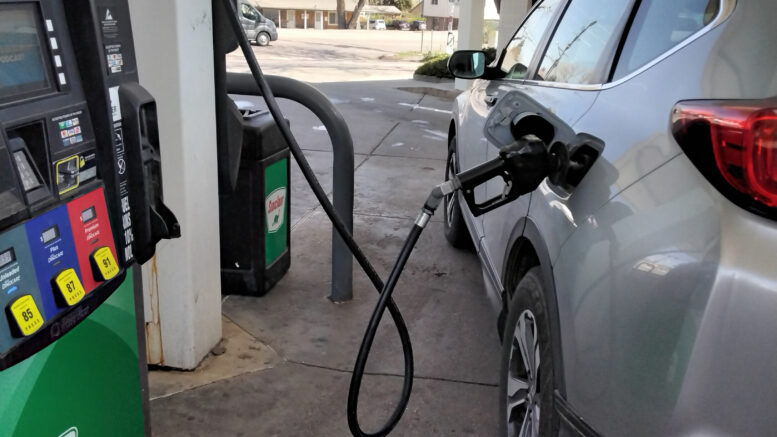Colorado convenience stores won’t have to attach stickers to gas pumps warning of the products’ environmental and public-health impacts after sponsors of a bill that sought to require the groundbreaking labels decided to kill it Wednesday in advance of a key hearing.
Sen. Lisa Cutter, a Morrison Democrat who’s sponsored numerous air-quality bills, told the Senate Transportation & Energy Committee that she wanted to educate purchasers of gas products about their danger in the same way cigarette-pack labels have done for decades. Her House Bill 1277 sought to make retailers selling fuel products via pumps or containers attach a label saying, “Warning: Use of this product releases air pollutants and greenhouse gases, known by the state of Colorado to be linked to significant health impacts and global heating.”
HB 1277 snuck through the House on a 33-30 vote on April 1, and it seemed to get a boost in the Senate when Sen. Faith Winter, the Broomfield Democrat who chairs the committee to which the bill was assigned, said she would sign on to cosponsor the bill with Cutter. But HB 1277 also attracted a lot of criticism for what critics called its attempt at “shaming” consumers who seek to buy gas — a tact that no other state has taken.
“A simple label” stoked a lot of criticism

Colorado state Sen. Lisa Cutter speaks at a February 2024 news conference at the Capitol to introduce a trio of air-quality bills.
On Wednesday, Cutter acknowledged that there was not a path for the bill to pass the Senate, which is more conservative than the House and has stopped or pared significantly back several bills in recent years that sought to ramp up regulations on the industry. And so, while Winter said the education of consumers of consumers would have led to better choices and Cutter also defended this approach, the sponsor asked committee members to kill the bill, which they did without objection.
“Industry has a lot of financial resources to advertise and present their part of the good story. And then we don’t always have the same resources — obviously, financial resources — to do those kinds of campaigns,” Cutter said. “And so, the idea of just putting a simple label on, like one does with a cigarette packet … just talking about the real dangers to air quality presented by fossil fuels was an important step. But after a lot of work and consultation, we have decided regretfully to (postpone indefinitely) the bill this year.”
The stickers that would have been required to be attached to gas pumps in both English and Spanish would have had to have been in font no smaller than 16 points in black ink on a white background. If a customer reported their absence to a business manager and they were not replaced within 45 days, those businesses could have been subject to customers filing lawsuits claiming deceptive trade practices, which are subject to penalties of $20,000 per violation.
Critics: Bill sought to shame gas buyers

Colorado state Reps. Junie Joseph and Jennifer Bacon explain House Bill 1277 to that chamber on April 1.
While committee members accepted Cutter’s killing of the bill without comment, many people are likely to be pleased with the death of HB 1277, which was sponsored in the House by Democratic Reps. Jennifer Bacon of Denver and Junie Jospeh of Boulder. The bill’s opponents included oil-and-gas advocates, every Republican in the House and gas-station operators, who may have been the loudest critics of the legislation.
“We are 100% opposed to these legislators in the majority shaming our customers when they come to our stations,” said Grier Bailey, whose Colorado Wyoming Petroleum Marketers Association represents gas stations, in an earlier email to The Sum & Substance. “Not only is this forced speech that is blatantly unconstitutional, but it is basically a punch to the face to Colorado’s citizens who actually support the entire highway system.”
One year ago, oil-and-gas proponents fought off a trio of bills meant to ramp up regulations on them significantly, as well as a proposal that would have banned new drilling in the state beginning in 2030. This year’s legislative efforts to rein in the industry have been much less — likely because of a deal last session between Gov. Jared Polis, major oil-and-gas producers and environmental groups — although producers continue to be subject to increasing regulations from state commissions.
